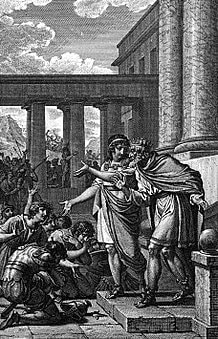Aeacus was the son of Zeus and Aegina (daughter of the river god Asopus). He would be the father of Telemon and Peleus and the grandfather of Achilles. He was known for his sense of justice.

During his birth, Zeus removed Aegina from the island of Oenone to protect her from her parents. The island would eventually take her name and be the birthplace of Aeacus. To inhabit the island, Zeus transformed all the ants into men, which formed the race of the Myrmidons (They would be led by Achilles during the Trojan War), to which Aeacus became the ruler. His rule over Aegina was known for its justice as he settled disputes all over Greece.
A legend preserved in Pindar relates that Apollo and Poseidon took Aeacus as their assistant in building the walls of Troy. When the work was completed, three dragons rushed against the wall, and though the two that attacked the sections of the wall built by the gods fell down dead, the third forced its way into the city through the portion of the wall built by Aeacus. Thereafter, Apollo prophesied that Troy would fall at the hands of Aeacus's descendants.
After his death, Aeacus became one of the three judges in Hades and, according to Plato, was specifically concerned with the shades of Europeans upon their arrival to the underworld. In works of art, he was depicted bearing a scepter and the keys of Hades.
Alexander the Great also traced his lineage back to Aeacus.
